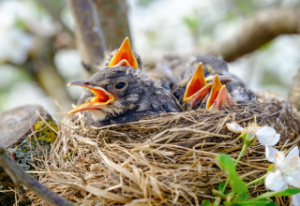
Global warming is leading to a fall in the number of nestlings of migrating birds and large birds. This finding emerges from a new international study including the University and Shamir Research Institute published in the prestigious journal PNAS. Conversely, the study found an increase in the number of nestlings among smaller, non-migrating birds. “The concern is that if the downward trend in the number of nestlings continues, this will impact the ability of the large and migrating bird species to survive in the long term. These birds play an important role in maintaining the global ecosystem,” explained Dr. Motti Charter of the University of Haifa and Shamir Research Institute, the Israeli partner in the study.
Previous studies have examined climate change’s impact on birds’ reproduction and migration habits. In the current study, Dr. Charter from the Department of Geography at the University and Shamir Research Institute, alongside a large team of researchers from across the world, set out to examine the impact of global warming on the reproduction of birds and specifically the number of nestlings they produce. In order to study and identify a connection between climate changes and changes in the number of birds, the researchers used data collected from specific species throughout the world over 15 years. “The number of researchers worldwide who have long-term monitoring data of a specific species is fairly small, making this study unique,” Dr. Charter commented. The researchers collected data on 201 breeding populations from 104 species of birds from every continent and a total of 745,962 nests. The study had data from 1970-2019 breeding seasons, including daily temperatures, the number of eggs, nestlings per pair, and the number of nests for each population.
The study results show that global warming decreased the number of nestlings produced in 57% of the species. Conversely, in 43% of the species, an increase was seen. Dr. Charter notes that the data reflect the complex impact of climate change and global warming. More specifically, the findings showed that large and migrating birds’ reproduction decreased, whereas smaller, non-migrating birds resident birds increased the number of nestlings they produced. “Smaller bird species may have a preference for warmer weather. They may also be able to adapt more rapidly to changing temperatures.
The study pointed out that large and migrating birds are producing less young. In addition, these birds play an essential ecological role in areas such as the dissemination of nutrients, pest control, maintaining biological balance, and so forth. Accordingly, damage to these species may be significant. Furthermore, if global warming continues, the decrease in the number of nestlings produced by migrating and large birds potentially can push sensitive species to extinction, thereby greatly damaging the ecosystem,” warned Dr. Charter.
27.2.23



